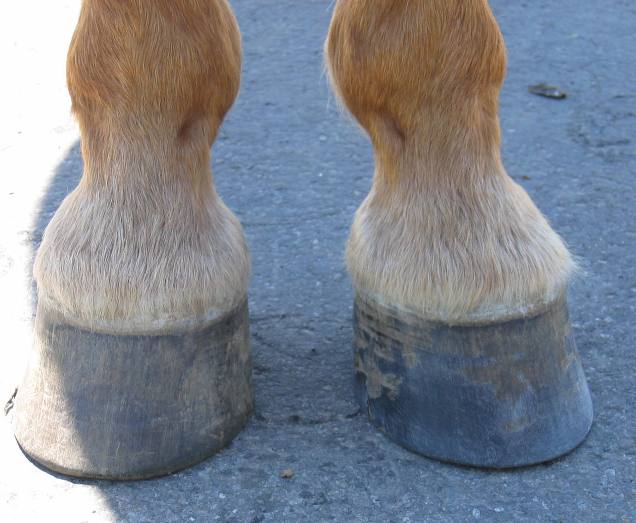Do Horses Need Shoes?
 The best way to answer the question of shoeing your horse is to first
understand why we deal with horses' feet to begin with. Much like we rely on our human feet, horses spend
nearly all their time standing, walking and running on theirs. Their hooves must be kept trimmed back just
like our toenails, and if shoed, the shoes must fit properly and sit well on the feet. Imagine that you
have allowed your toenails to grow out about an inch and then tried to shove your feet into shoes a size
to small. Now imaging walking like that and you can somewhat understand why hoof care is so
important. The best way to answer the question of shoeing your horse is to first
understand why we deal with horses' feet to begin with. Much like we rely on our human feet, horses spend
nearly all their time standing, walking and running on theirs. Their hooves must be kept trimmed back just
like our toenails, and if shoed, the shoes must fit properly and sit well on the feet. Imagine that you
have allowed your toenails to grow out about an inch and then tried to shove your feet into shoes a size
to small. Now imaging walking like that and you can somewhat understand why hoof care is so
important.
Even if you do not shoe your horses, you must clip and file their hooves.
Hooves that are allowed to go unclipped can become brittle, like our toenails, and break or crack. This can
cause your horse to become lame and make it very painful for them to walk. A lame horse with bad feet can
develop balance and spine problems. In the wild, these things would have happened naturally as the horses moved
from terrain to terrain, but in captivity it is up to you, the owner, to make sure your horse is cared for.
Remember! Proper hoof care is just as important for horses as proper foot care is for you.
So how do you go about finding out if shoeing your horses hooves is the best
decision for your horse? Begin by finding a farrier that will examine your horse from a foal and help you
decide, based on what the intended purpose of your horse is, whether shoeing is right for your horse. Breeding
is beginning to affect the quality of horse hooves and while most breeders are busy focusing on the look of the
horse, many are forgetting that the look is lost if the horse can't walk in its later years. What natural
selection may have bred out on its own, horses are continuing to pass down through poor breeding
programs.
If you plan to work your horses, chances are that you will be shoeing your
horses for their protection. Your horses will need to have their hooves trimmed every six weeks and that is an
excellent opportunity to speak with your farrier about how its hooves are doing and whether or not shoeing an
otherwise un-shoed horse is a good idea. Let your farrier know what you plan to do so that he or she can give
your horse the right shoes for the job. It is important that owners understand that shoeing a horse does not
stop the hooves from growing, nor does it mean you can fore-go that six week trimming. Doing so can cause your
horse to go lame.
If your horse is not a work horse, has tough and smooth hooves that don't get
too long or deformed and your activities otherwise don't require special shoes (for example taking a rocky
trail rather than a grassy one), then it is quite possible your farrier will tell you that your horse can go
barefoot. Shoes do come with drawbacks such as extra cleaning, they can get caught on things, and it is even
less fun to be kicked by a shoed hoof than an un-shod hoof, but only you and your farrier can make the best
decision for your horse.
Related Articles
Stable Building Tips
Bedding Pros and Cons
Mucking Out Your Horse's Stall
Feeding Your Horse
What To Feed Your Horse
Giving Up Your Horse
Horse Grooming
Do Horses Need Shoes?
Teeth and Horses
Winterizing Your Barn
Preparing to Travel With Your Horse
Winter Care for Horses
Preventing Barn and Stall Boredom
Tips for Traveling with Your Horse
Stable Requirements:
Building the Space to Meet Your Horses' Needs
Preparing Your Horse for Hot Weather
Tips for Maintaining Your Horse Trailer
Proper Hoof Care
Why Braiding Horse Hair is Beneficial to
Their Health
Tips for Taking Care of an Older Horse
How to Keep Your Horse Fed on a Budget
Transitioning Horses from Winter Feed to
Spring Feed
Why You Should Feed Your Horse Flaxseed
Dealing With an Unhappy Horse in Their
Stall
|